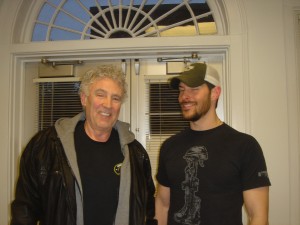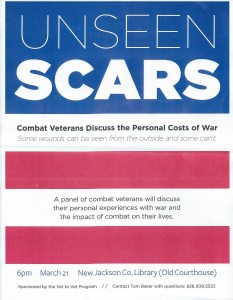
Vietnam War veteran, Tom Baker (left), and Iraq War veteran, Erik Watkins meet at Vet to Vet meetings on a regular base. Photo by WCJ.
Western Carolina University was recently designated a “top school” in the Military Advanced Education 2015 Guide to Colleges & Universities. It’s no wonder why the university grabbed that distinction with people like Tom Baker from the Vet to Vet program.
Baker, a chief organizer of the Vet to Vet program, has been interviewing with local media outlets since the summer to inform the community of his new group.
He describes the program as a grassroots effort not attached to the Veterans Affairs program or any kind of bureaucracy. It’s an informal gathering of “a bunch of veterans that have gotten together to try and help other veterans,” said Baker.
Inspiration to start the group came from the alarming suicide rate of returning veterans: 22 per day. That is higher than the rate of death for active combat servicepersons.
According to an article from the Los Angeles Times, the suicide rate among recent veterans is 50 percent higher than non-military civilians.
Experts attribute the cause of this to post-traumatic stress disorder(PTSD). PTSD can take many forms such as unexplained anger or emotion, flashbacks, excessive drinking, and unfortunately suicide.
Most veterans do not like to be labeled or diagnosed with PTSD as it creates a ne gative perception of them. Baker said the best way a veteran can work through the stress is to talk with people that have been in similar situations.
gative perception of them. Baker said the best way a veteran can work through the stress is to talk with people that have been in similar situations.
Baker is a combat veteran who served in the Army during the Vietnam War as a door gunner which had the lowest life expectancy of any combat role.
“It’s tough to fit in with people who haven’t been through what you’ve been through. You try to blend in but it’s not easy,” said Baker.
The Vet to Vet program is open to veterans of all branches, services and rank. Baker said the informal setting helps to make everyone feel comfortable. They never try to pull anything out of anyone, and that it helps to know that you’re not alone.
The Jackson County Veteran Support Group is another local organization that specializes in PTSD. Daniel Sewell, combat veteran, member and co-founder of the group, said their organization provides a good venue for returning veterans to talk about their experiences.
Sewell said they are here for veterans that need to take the first step. It’s a long healing process, and people will change when they are ready. Both organizations recently held the second in a series of the joint program called “Unseen Scars,” a round table discussion by combat veterans on the personal costs of war. The unseen scars range from emotional trauma and disconnected relationships to drinking and depression.
Geared toward veterans and their families, the program seeks to tell personal stories of war, show returning veterans that they aren’t alone, and to provide an understanding connection with loved ones.
Baker said at their first “Unseen Scars” program held on Veteran’s Day, a young lady brought her father, a combat veteran who hadn’t talked to his family about his experiences until that night. He said the program helped the young lady and her father to reconnect.
Many more stories like these are bound to happen with the continuation of this program. The most recent one was held on March 21 at the new Jackson County Public Library.
Both organizations strive to create an atmosphere of welcoming and comfort where veterans can feel safe to talk, cry or just listen.
“These young veterans deserve all the help they can get. If we can help them in some little way, we hope they will come and be with us,” said Baker.
The Vet to Vet program meets at 4 p.m. on the first and third Sunday of every month in the Moore building at WCU. For more information contact Tom Baker at 828-508-5522 or at trbaker817@yahoo.com.
For more information on the Jackson County Veteran Support Group, contact Daniel Sewell at 828-736-4645.
Related Stories:
Unseen Scars: The battle against PTSD
Unseen Scars roundtable discussions


